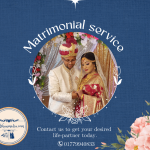Unveiling the Reasons Behind Doubts About Marriage-23
Unveiling the Reasons Behind Doubts About Marriage-23

Introduction :
Marriage is a significant life decision that brings together two individuals in a lifelong commitment. However, doubts about marriage can arise and cast a shadow of uncertainty on this sacred institution. These doubts can stem from various factors, both internal and external. Understanding the underlying reasons behind these doubts is crucial in order to navigate the complexities of marriage. This article explores some common reasons for doubts about marriage, shedding light on the intricacies and offering insights for those grappling with uncertainty.
- Fear of Commitment : One of the primary reasons for doubts about marriage is the fear of commitment. Making a lifelong commitment to another person can be daunting, as it involves surrendering individual autonomy and embracing a shared life. Fear of losing personal freedom or the inability to envision a long-term commitment can lead to doubts and hesitation about entering into marriage.
- Unrealistic Expectations : Unrealistic expectations about marriage and the role of a spouse can contribute to doubts. Society often romanticizes the idea of marriage, perpetuating the notion of a perfect, fairy-tale relationship. When reality fails to align with these lofty ideals, doubts and disillusionment can set in. Unrealistic expectations about constant happiness, perpetual romance, or solving personal problems through marriage can lead to doubts about the feasibility of a successful union.
- Lack of Compatibility : Compatibility is a crucial factor in a successful marriage. Doubts may arise when individuals realize significant differences in values, goals, or lifestyles with their prospective partners. Fundamental incompatibilities, such as conflicting core beliefs or vastly different communication styles, can cast doubt on the long-term viability of the relationship.
- External Influences and Pressure : External influences, such as societal norms, familial expectations, or pressure from peers, can contribute to doubts about marriage. Cultural or religious expectations may dictate specific roles or marital obligations, which may clash with individual aspirations or desires. The fear of judgment or disapproval from family, friends, or society can sow seeds of doubt, prompting individuals to question their readiness for marriage.
- Past Experiences and Baggage : Previous experiences, including failed relationships or traumatic events, can leave individuals carrying emotional baggage into future commitments. Lingering feelings of distrust, fear of vulnerability, or unresolved emotional wounds can cast doubt on the feasibility of a healthy and fulfilling marriage. These past experiences can create a reluctance to fully invest in a new relationship, triggering doubts about whether the past will repeat itself.
- Fear of Losing Identity : Marriage often involves a merging of lives, which can lead to fears of losing one’s individual identity. Doubts may arise when individuals question whether they can maintain their own sense of self while simultaneously building a shared life with a partner. The fear of sacrificing personal goals, interests, or independence can spark doubts about marriage and the potential loss of one’s own identity.
- Communication and Conflict Resolution Concerns : Effective communication and conflict resolution are vital for a healthy marriage. Doubts may emerge when individuals realize they struggle with these essential relationship skills. Difficulty expressing needs, avoiding conflicts, or being unable to find common ground can create doubts about the ability to navigate the inevitable challenges that arise in a marital relationship.
Conclusion :
Doubts about marriage can stem from a myriad of reasons, ranging from fears of commitment and loss of personal identity to unrealistic expectations and lack of compatibility. Understanding and acknowledging these underlying factors is crucial for individuals grappling with doubts. Open communication, self-reflection, and seeking professional guidance can aid in navigating these concerns. By addressing doubts honestly and proactively, couples can make informed decisions about their readiness for marriage or work toward strengthening their relationship before taking the next step.
Nurturing Marital Confidence: Remedies for Doubts About Marital Life

Introduction :
Doubts about marital life can be unsettling, but they are not uncommon. It’s essential to address and resolve these doubts to build a strong and fulfilling partnership. This article explores effective remedies for doubts about marital life, providing practical solutions to navigate uncertainties and foster marital confidence. By implementing these remedies, couples can strengthen their bond, enhance communication, and build a solid foundation for a happy and lasting marital relationship.
- Open and Honest Communication : Open and honest communication is the foundation of a healthy marital relationship. Expressing doubts, concerns, and fears to your partner allows for mutual understanding and a chance to address any underlying issues. Create a safe and non-judgmental space where both partners feel comfortable sharing their feelings. Practice active listening and strive for empathy to foster effective communication and build trust.
Open and Honest Communication: The Bedrock of a Strong Bangladeshi Marriage
In the tapestry of Bangladeshi marriages, steeped in tradition and evolving social norms, open and honest communication stands as a vital thread. While arranged marriages remain a prevalent custom, modern couples increasingly seek compatibility and connection beyond family ties. This is where effective communication becomes the cornerstone of a happy and fulfilling marriage.
Challenges and Roadblocks:
- Shifting Roles and Expectations: With women entering the workforce in greater numbers, traditional gender roles are blurring. Spouses might struggle to navigate these changing dynamics and express their evolving needs without open communication.
- Cultural Nuances: Direct communication, while crucial, might not always be the Bangladeshi way. Couples might find comfort in a more indirect approach, expressing concerns subtly or involving family members in sensitive conversations.
- Unfamiliarity with Open Communication: Traditionally, emotional expression and open discussions about needs and feelings might not have been encouraged. Spouses may lack the communication skills necessary for addressing complex issues.
The Rewards of Open Communication:
- Stronger Bond and Trust: Sharing thoughts and feelings openly fosters emotional intimacy and strengthens the foundation of trust within the marriage.
- Conflict Resolution: Open communication allows couples to address disagreements constructively, find common ground, and reach solutions that work for both partners.
- Greater Understanding: Honest conversations help couples understand each other’s perspectives, needs, and desires, leading to a deeper sense of connection.
Building Bridges: Effective Communication Strategies:
- Active Listening: Pay close attention to your partner’s verbal and nonverbal cues. Show them you’re genuinely trying to understand their point of view.
- “I” Statements: Express your feelings and needs using “I” statements to avoid blame. For example, “I feel hurt when…” instead of “You always…”
- Respectful Communication: Maintain a respectful tone, even during disagreements. Avoid personal attacks, name-calling, or hurtful language.
- Focus on Problem-Solving: Approach communication as a collaborative effort to find solutions together.
- Seek Professional Help: Consider seeking guidance from a therapist or counselor who can provide tools and strategies for effective communication, especially if cultural sensitivities come into play.
Finding the Right Balance:
- Respecting Cultural Comfort Levels: While open communication is crucial, couples should find a communication style that feels comfortable within the Bangladeshi context. This might involve indirect communication or including family members in sensitive discussions.
- Openness to Growth: Effective communication is a skill that can be learned and developed over time. Be open to learning new communication techniques and adapting your approach as your relationship evolves.
The Takeaway:
Open and honest communication is the lifeblood of any successful marriage, and Bangladeshi marriages are no exception. By prioritizing clear communication, couples can build a strong foundation of trust, navigate challenges effectively, and create a lasting and fulfilling relationship. As societal norms continue to evolve, open communication will become an even more essential tool for navigating the complexities of modern marriages in Bangladesh.
- Seek Professional Guidance : Professional guidance can provide valuable insights and support when facing doubts about marital life. Couples therapy or counseling can offer a neutral and supportive environment to explore concerns, improve communication, and develop conflict resolution skills. A trained therapist can guide couples through a process of self-discovery, helping them understand the root causes of their doubts and offering strategies to overcome challenges.
- Self-Reflection and Personal Growth : Engaging in self-reflection and personal growth is instrumental in resolving doubts about marital life. Take time to introspect and understand your own needs, desires, and values. Identify areas where personal growth is needed and work on developing those aspects. This process of self-improvement not only benefits the individual but also strengthens the relationship by fostering self-awareness and personal fulfillment.
- Clarify Expectations and Set Realistic Goals : Doubts may arise from unmet or mismatched expectations within a marital relationship. Take the time to clarify expectations with your partner, discussing important aspects such as career goals, financial planning, family planning, and division of household responsibilities. Setting realistic goals together allows for alignment and a shared vision for the future. Regularly revisit and reassess these goals to ensure they remain relevant and attainable.
Clarifying Expectations and Setting Realistic Goals: A Guide to Success
Whether you’re embarking on a new marriage, starting a business venture, or simply aiming for personal growth, clarifying expectations and setting realistic goals are crucial first steps. Here’s how to approach this process effectively:
Clarifying Expectations:
- Open Communication: Engage in open and honest conversations with all involved parties. This could be your spouse, business partner, or even yourself.
- Identify Individual Needs: Discuss what each person hopes to achieve. What are your individual goals and aspirations?
- Outline Responsibilities: Clearly define roles and responsibilities. Who will be responsible for what tasks or contributions?
- Discuss Dealbreakers: Identify any non-negotiables or dealbreakers that could potentially derail your plans later on.
Setting Realistic Goals:
- SMART Goals: Utilize the SMART goal framework. Goals should be Specific, Measurable, Achievable, Relevant, and Time-bound.
- Consider Resources: Be realistic about the resources available – time, money, skills, and support systems. Don’t set yourself up for failure by aiming for something unachievable.
- Break Down Large Goals: If your goals seem overwhelming, break them down into smaller, more manageable steps. This creates a roadmap for progress and a sense of accomplishment as you complete each step.
- Build in Flexibility: Life rarely goes according to plan. Be prepared to adapt your goals as needed based on unforeseen circumstances.
The Benefits of Clarity and Realism:
- Reduced Conflict: When expectations are clear from the outset, misunderstandings and conflicts are less likely to arise.
- Increased Motivation: Realistic goals provide a sense of direction and achievement, keeping you motivated and engaged in the process.
- Improved Decision-Making: Clarity about expectations allows for better decision-making as everyone involved is working towards the same objectives.
- Stronger Relationships: Open communication and shared goals foster trust, collaboration, and a stronger foundation for any endeavor.
- Cultivate Trust and Emotional Intimacy : Building trust and emotional intimacy is vital for overcoming doubts in a marital relationship. Trust is developed through consistent honesty, reliability, and open communication. Work on fostering emotional intimacy by creating moments of vulnerability and deep connection. Engage in activities that promote emotional closeness, such as sharing dreams and fears, engaging in regular date nights, and prioritizing quality time together.
- Continuous Learning and Relationship Enrichment : Investing in continuous learning and relationship enrichment can help alleviate doubts and strengthen marital bonds. Attend workshops or seminars that focus on enhancing relationship skills, such as effective communication, conflict resolution, and intimacy. Read books or listen to podcasts on healthy relationships and marriage to gain valuable insights and practical tools. Embrace opportunities for personal and couple growth to nurture a fulfilling and thriving marital life.
- Embrace Flexibility and Adaptability : Flexibility and adaptability are essential qualities for navigating doubts in marital life. Relationships evolve and change over time, and it’s important to be open to adjustments and modifications. Embrace flexibility in roles, responsibilities, and expectations, recognizing that both partners may grow and change as individuals. Being adaptable allows for a more harmonious and resilient marital relationship.
- Nurture a Supportive Network : Surrounding yourselves with a supportive network of family, friends, and like-minded couples can provide encouragement and guidance when facing doubts about marital life. Seek out mentors or couples who have experienced similar challenges and have successfully navigated them. Sharing concerns and seeking advice from trusted individuals is an important aspect of overcoming doubts about marital life. Here are some suggestions on how to cultivate a supportive network:
Family and Friends: Reach out to close family members and friends who have a positive influence on your life. Share your doubts and concerns with them, seeking their perspective and advice. They can offer emotional support, guidance, and reassurance based on their own experiences.
Mentors and Role Models: Identify mentors or role models who have successful and fulfilling marriages. These individuals can provide valuable insights and advice based on their own journey. Seek their wisdom and learn from their experiences to gain a fresh perspective on your own doubts.
Support Groups: Consider joining support groups or communities specifically designed for couples facing challenges in their marital life. These groups provide a safe and non-judgmental space to share your concerns and receive support from others who may be going through similar situations.
Professional Advisors: Consult professionals such as marriage counselors, therapists, or religious leaders who specialize in relationship guidance. They can provide objective advice, facilitate constructive discussions, and offer practical tools to address doubts and strengthen the marital bond.
Online Forums and Resources: Engage in online forums, blogs, or social media groups dedicated to marriage and relationship support. Participate in discussions, share your concerns, and benefit from the experiences and advice of a wider community. However, exercise caution and ensure the credibility of the sources you engage with online.
Remember, while seeking advice from others is valuable, ultimately, every marital relationship is unique. Trust your instincts and use the advice you receive as a guide rather than a definitive solution. The goal is to gather different perspectives, evaluate them in the context of your own relationship, and make informed decisions that best suit your specific circumstances.
“বিয়ে সংক্রান্ত যেকোনো তথ্য ,সেবা এবং পরামর্শ পেতে যোগাযোগ করুন গুলশান মিডিয়ার সাথ। ” কল করুন:01779940833
ইমেইল:gulshanmedia2@gmail.com







